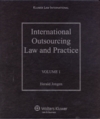| |
| Författare: | Jongen Herald
| | Titel: | International Outsourcing Law and Practice | | Anmärkning: | Vid köp av ett lösbladsverk tecknas samtidigt en stående order på den kommande utgivningen av supplement. En stående order gäller till dess att kunden säger upp den. | | Utgivningsår: | 2008 | | Förlag: | Kluwer | | ISBN: | 9789041125422 | | Produkttyp: | Lösblad | | Ämnesord: | Förmögenhetsrätt
, Internationell rätt
|
|
Pris: 2750 SEK exkl. moms  |  International Outsourcing Law and Practice is a robust and comprehensive, single-volume resource that presents valuable guidance on outsourcing in the world’s key markets. The insight available in International Outsourcing Law and Practice extends well beyond legal analysis. This professional resource helps you understand why and where you should outsource and examines the real practicalities in the business environment. It provides: International Outsourcing Law and Practice is a robust and comprehensive, single-volume resource that presents valuable guidance on outsourcing in the world’s key markets. The insight available in International Outsourcing Law and Practice extends well beyond legal analysis. This professional resource helps you understand why and where you should outsource and examines the real practicalities in the business environment. It provides:
• In-depth analysis of different types of agreements to help you choose the best one.
• Step-by-step guidance presented from a transactional perspective to make sure you ask the right questions and make right decisions from start to finish.
• Expert, local insight into key markets, including India, China, Poland, Hungary, Czech Republic to help you understand local perspectives and requirements
• Precise advice about what to do once the deal is completed in order to avoid common pitfalls and liability
• Insights into why projects fail—to help you make sure yours don’t!
• International Outsourcing Law and Practice fully covers every relevant area of the law, including:
1. Labor Law in Foreign Jurisdictions
2. Tax Requirements and Implications
3. Antitrust Issues
4. Privacy Rules
Table of contents
Chapter 1. What Is Outsourcing? Herald Jongen, Allen & Overy, Amsterdam
Chapter 2. Why Outsource? A Strategic Choice with Many Consequences Arno IJmker and Andriy Sheychenko, Quint Wellington Redwood
Chapter 3, Trends in Outsourcing John Buscher, TPI Chapter 4. Offshoring and Outsourcing: Political and Economical Implications Désirée van Gorp, Nyenrode Business University
Chapter 5. Better, Faster and Cheaper: How Do Suppliers Make Money? Frank Grift, Computer Sciences Corporation
Chapter 6. Global Sourcing: Beyond Cost Cutting Martin de Wit, Bernd Wondergem and Theo Huibers, Thaesis, The Netherlands
Chapter 7. The Contracting Process from RFP until Closing Filip van Elsen and Mark Hoenike, Allen &
Overy, Antwerp / Hamburg
Chapter 8. Outsourcing Contract Structures Ian Ferguson, Allen & Overy, London Chapter 9. Service Level Agreements André Duminy and David Griffiths, Clifford Chance, London
Chapter 10. Employment Issues Pieter de Koster, Christian Bayart, Ilse Bosmans and Caroline Deiteren, Allen & Overy, Brussels
Chapter 11. Tax Issues Wilbert Kannekens, KPMG Meijburg
Chapter 12. Competition Issues Robbert Snelders and Paul-John Loewenthal, Cleary Gottlieb Steen & Hamilton, Brussels
Chapter 13. Privacy, Data Protection and Cross-Border Dataflow Emmanuel Michau, Cabinet Michau, Paris
Chapter 14. Pricing Mechanisms Bart van Reeken and Lokke Moerel, De Brauw Blackstone Westbroek, The Hague
Chapter 15. Outsourcing in a Multi-Supplier Environment Trevor Nagel and Lee Van Blerkom, Alston & Bird, Washington
Chapter 16. The Point of Good Governance Ronnie Lachniet, Quint Wellington Redwood
Chapter 17. Is Sufficient Attention Given to Intellectual Property Issues in Outsourcing Projects? Bo Söderberg, Per Josefson, Martin Pekkari and Stefan Widmark, Mannheimer Swartling, Stockholm Chapter 18. An Introduction to Offshoring Alan Meneghetti, Clyde & Co., Guildford
Chapter 19. Why Outsourcing Projects Fail Greg Cole, formerly of Gartner
Chapter 20. Exiting an Outsourcing Agreement Ian Ferguson, Allen & Overy, London
Chapter 21. Renegotiating an Outsourcing Agreement Alan Meneghetti, Clyde & Co., Guildford
Chapter 22. The Role of Alternative Dispute Resolution in Outsourcing Contracts Greg Cole, formerly of Gartner
Chapter 23. Lessons Learned and Pitfalls Herald Jongen, Allen & Overy, Amsterdam | | |
|